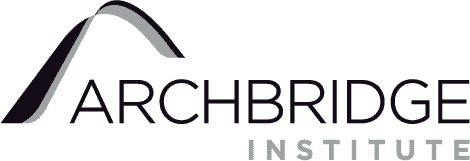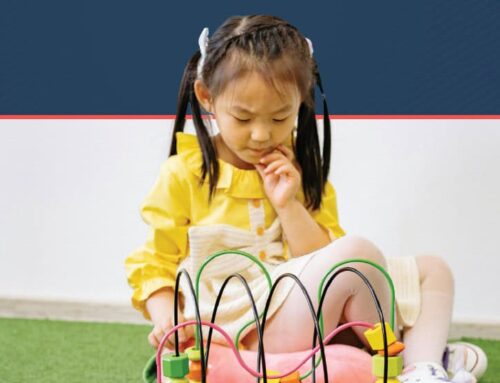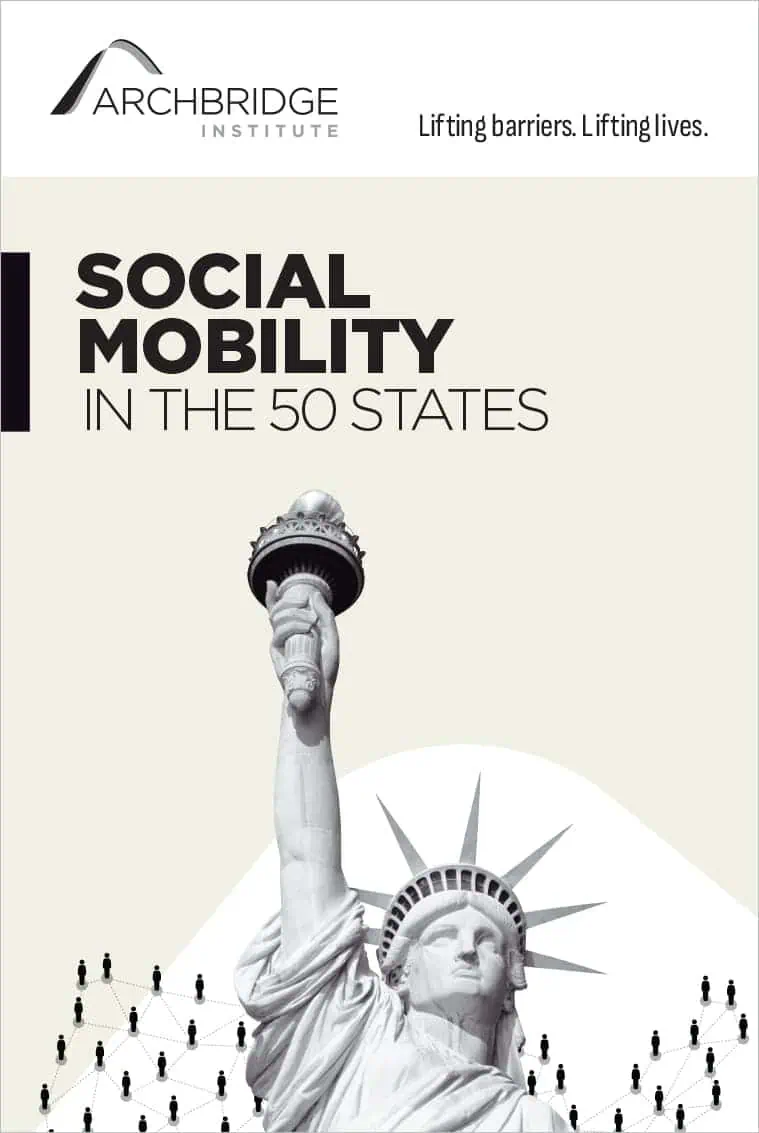
Prologue
By Gonzalo Schwarz, President & CEO
The Archbridge Institute is pleased to release “State Solutions to Empower Upward Mobility,” a compilation of essays featuring state-based policy reforms to increase economic opportunities and improve upward mobility for Americans across the 50 states. We hope this publication, along with our “Social Mobility in the 50 States” report, will serve as a framework for removing barriers to human flourishing. We are grateful to all the authors and organizations who contributed to this publication.
We are delighted to include a foreword from Gov. Spencer Cox of Utah, which ranked first in our 2023 report “Social Mobility in the 50 States.” He makes a great case for the American Dream, which rejects zero-sum thinking and promotes a positive narrative for all citizens.
At the Archbridge Institute, we take a holistic view of social mobility that is aligned with the economics of human flourishing. That is why we are inspired to share eight policy ideas across the lifespan that we believe will foster mobility and help more people achieve their American dreams.
Foreword
By Spencer Cox, Governor of Utah
In case you haven’t heard, Utah is thriving. For the second year in a row, U.S. News and World Report named Utah the best state in the nation. We have the best economy in the country and the best quality of life. We lead the nation in GDP growth, our taxes are low, and we have a strong entrepreneurial spirit. We’ve got a new National Hockey League team, the PGA and LPGA and, of course, come July 24, we expect to be named the host of the 2034 Winter Olympics.
So what’s the secret of our success?
Someone from out of state recently mentioned to me that Utah has built-in advantages. I wholeheartedly agreed, noting that Utah is the most beautiful state in the nation, with five national parks, 48 state parks, and the greatest snow on Earth. While our landscapes are stunning, he said, that’s not what he meant. Instead, he said every Utahn he had met was hardworking, honest, patriotic, cared about their neighbors, and cared about their families. Simply put, our advantage is our people.
As the Archbridge Institute Social Mobility Index notes, Utah ranks highest on upward mobility, meaning that if you start life poor, living in Utah is your best shot at climbing out of poverty. Of all the reasons I’m proud of Utah, this is at the top of the list, and it’s worth offering the reasons for our success.
First and foremost, we care about our fellow Utahns. Every year, Utah leads the nation in service, volunteering, and charitable giving. This matters. By serving others and giving back, we build community.
Second, we still believe in the power of our institutions— our schools, civic organizations, nonprofits, and religious groups. These institutions foster common bonds, give us a place to serve and belong, and hold us accountable to each other.
Third, we’re creating policies that expand opportunities for all. Certainly, government alone can’t solve the problems for each of its citizens, but it can and should be an active participant in helping people create a better life.
For example, more than 25 years ago, Utah started consolidating public assistance programs and employment programs under one roof. The Utah Department of Workforce Services became a one-stop-shop for food, medical, child care, utility and financial assistance as well as unemployment insurance, vocational rehabilitation, and help with skill-building and job searching. By operating in a unified way, the department has streamlined how it delivers resources to those families and individuals who need it most and has become a national model other states are trying to follow.
This holistic, work-first model assists Utahns in getting their first jobs, finding better jobs, and obtaining fulfilling careers. When someone registers for temporary public assistance or unemployment insurance, they start at jobs.utah.gov. When someone needs face-to-face service for public assistance program eligibility, they come to one of 30 American Job Centers, where employers are often on site recruiting for available jobs, and our staff engage citizens in work and education opportunities.
Workforce Services plays an important role as part of the social capital network in helping meet Utahns where they are and developing a path forward to enhanced economic prosperity. The collaborative partnerships with state and local governments as well as community organizations is critical to this effort.
Education is another critical element of upward mobility, but degrees have become a barrier to entry in too many jobs. Earning a degree is a valuable way to create social mobility, but a degree should not be the only way to get a good paying job or have a fulfilling career.
In Utah, we recognize the importance of both higher education and the importance of skills-based hiring. Today, about 98% of executive branch jobs do not require a degree. Instead, the state’s hiring managers and hiring committees consider comparable experience as equal to educational qualifications at every step in the evaluation and recruiting process. A common narrative is that government is slow to adopt private sector innovations, but Utah’s leadership in skills-based hiring is one area where we’re encouraging the private sector to follow our lead. We’re grateful for private sector employers like Delta who are helping set the pace.
Social capital is about we, not me. Too many Americans believe if I win, you lose. But instead of a scarcity mentality, Utahns believe that if someone else wins, it’s good for all of us. I’m proud that we reject zero-sum thinking. Utah is a place where the American dream is still possible and our people are our strength.
Introduction: A Lifecyle Approach to Social Mobility
By Ben Wilterdink
For generations, the American Dream has been a touchstone of American life—a source of optimism and hope that hard work and integrity are the keys to a better life for oneself and those we care about. Despite the many challenges we face today, the Dream is still alive and well, at least according to most Americans. But preserving the American Dream is not something that can be taken for granted. Rather, it requires a concerted effort to ensure that future generations have access to opportunities for success and the chance to live their lives on their own terms. Achieving this task cannot be accomplished through piecemeal efforts here and there alone. Instead, we must adopt a more holistic approach, one that aims to lift barriers to success at each point in a person’s life, ensuring that at every turn, there is an abundance of opportunities to fulfill one’s fullest potential.
While the American Dream is an idea, an aspiration, there are some ways in which economists and policymakers have sought to approximate it. One way to do this is by measuring the rate of intergenerational economic mobility, or, put simply, by examining whether a person is able to earn more, in real dollars, than their parents did at the same age. Increasing upward economic mobility is an exemplary goal, not least because, at least in absolute terms, everyone can potentially earn more than their parents and achieve a higher standard of living. Rather than the divisive “us vs. them” dynamic inherent to the obsession with inequality, mobility offers an opportunity for everyone to be better off.
Through careful consideration of these policies and others like them, policymakers can preserve and expand the American Dream for years to come. In practical terms, achieving higher rates of upward economic mobility means ensuring more opportunities to work, climb the income ladder, or even start new businesses. Policymakers rightly care a great deal about fostering a healthy environment for economic growth, new business creation, and more employment opportunities. However, these aspects of economic success are only one side of the opportunity coin. The other side is concerned with cultivating the skills and prerequisites necessary to seize and fully take advantage of such opportunities. Only by focusing on both sides of this coin—on the whole person—can policymakers most effectively achieve the goal of preserving and promoting the American Dream.
To that end, this publication is divided into two distinct sections. The first section is concerned primarily with setting a solid foundation for success, beginning early in life. Encouraging stable families, giving kids the opportunity to develop essential skills, providing a range of educational choices, and supporting the ability to gain vital early work experience are all fundamental building blocks to a successful life. The second section picks up where the first leaves off. Lowering barriers to employment opportunities, expanding opportunities for flexible work arrangements, legalizing home-based businesses, and promoting affordable housing are key components of providing options for those entering the workforce, advancing in their careers, or starting families. Taken together, these policies build toward the success that happens when proper preparation meets opportunity.
Contents
Part 1: Building a Foundation for Success
- Starting with a Strong Foundation: Reducing Marriage Penalties to Put Children First | By Willis Krumholz
- Unlocking the Power of Play: Soft Skills and the Future of Work | By Ben Wilterdink
- Education Freedom: A Path to Upward Mobility | By Erica Jedynak
- Setting People Up for Career Success: Youth Employment and Early Work Experience | By Ben Wilterdink
Part 2: Lifting Barriers to Opportunity
- Easing Paths to Employment: Removing Occupational Licensing Barriers | By Conor Norris and Edward Timmons
- The Independent Workforce: Legalizing Access to Flexible Benefits | By Liya Palagashvili
- Standing Up for Small Businesses: The Home-Based Business Fairness Act | By Heather Curry
- Lifting the “Paper Wall”: Legalizing Accessory Dwelling Units for Housing Affordability | By Emily Hamilton





